PHOTO: Europa Press News / Contributor
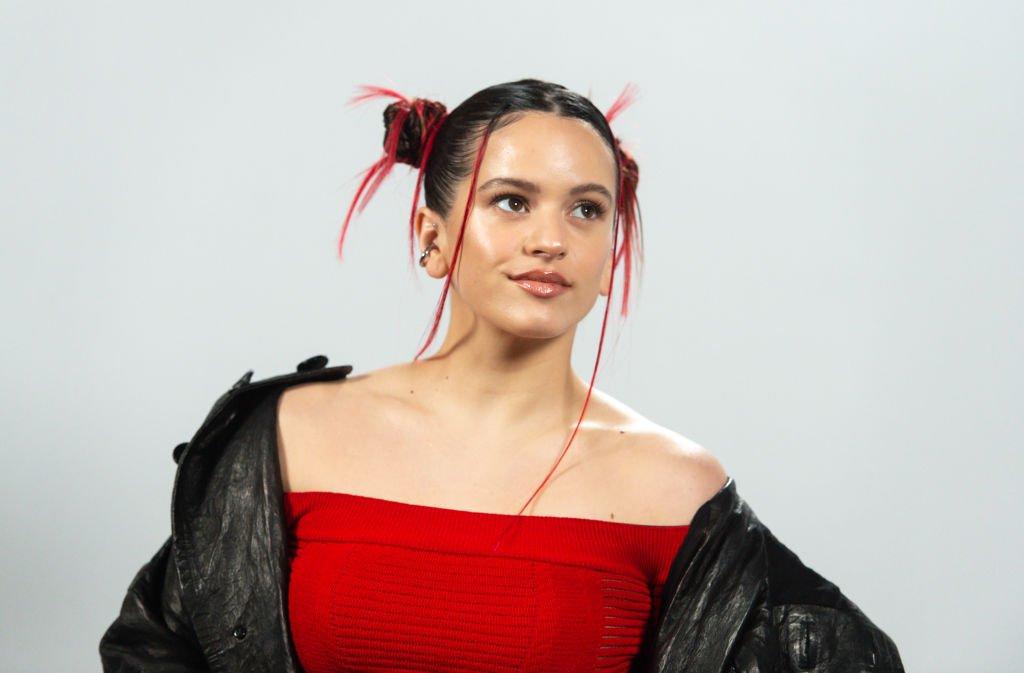
list
5 Takeaways From Rosalía's Genre-Spanning New Album 'Motomami'
'MOTOMAMI,' Rosalía's widely experimental third LP, may be remembered as one of the most ambitious albums of the decade — regardless of genre
When Spanish singer/songwriter Rosalía released her second album, El Mal Querer, in 2018, her seamless fusion of hip-hop en español with authentic flamenco roots was visionary. It was the kind of fully formed manifesto that most artists can only deliver once in their career.
It turns out, Rosalía was just getting started.
Two years in the making, her new album, MOTOMAMI, is a cosmopolitan, ever-expansive mosaic of moods and styles — mostly nocturnal, all unified by her laser-sharp sensibility.
There seems to be no end to Rosalía's sense of curiosity and thirst for experimentation. Here are five key takeaways from her new album, MOTOMAMI:
MOTOMAMI is a postmodern collage
Sliding skittishly from genre to subgenre — this is very much an album made for an era when people consume music in 30-second snippets — MOTOMAMI brims with stylistic intrigue and a devilish sense of humor. Its 16 miniature tracks offer a plethora of hidden corners, interconnections and secret passages to uncover and reinterpret for years to come.
In the future, MOTOMAMI will probably be remembered as one of the most ambitious albums of the decade, regardless of genre. As a result, a blanket branding as "a Latin artist" would be a disservice to her craft. Like M.I.A. or Joni Mitchell, she is a woman of the world.
It's not the genre — it's what you bring to it
Because reggaetón and Latin trap have taken over the planet in terms of commercial acceptance, an obscene deluge of tracks has followed. This has nothing to do with the urbano genre and its potential for greatness, and Rosalía mines reggaetón's popularity without falling into cliche.
MOTOMAMI is notable for its stylistic breadth. "BULERÍAS" almost sounds as if it was lifted from a vintage flamenco session, while a number of other tracks rely on the instantly recognizable reggaetón thump.
But on songs such as "CANDY" and "DIABLO," Rosalía transcends expectations with unusual melodic turns and sophisticated textures. On a visceral level, the purity of her voice sounds majestic against the propulsive reggaetón beats.
On rare occasions, too many cooks will do just fine
A hilarious meme circulated years ago comparing a song by Queen (one songwriter, one producer) with a mega-hit of the modern era, concocted by a battalion of expensive tastemakers.
MOTOMAMI is surprisingly ascetic in terms of guest artists. We get the Weeknd learning to sing bachata in Spanish and Dominican rapper Tokischa adding layers of panache to "LA COMBI VERSACE." Vocally, the album is (mostly) all Rosalía.
You may get dizzy just glancing at the album credits, though. Ten different songwriters are listed on a single track, and besides the welcome return of Barcelona-based El Guincho, some of the world-class producers here include Frank Dukes, Sky Rompiendo, Michael Uzowuru and Tainy. But there is nothing disjointed about the finished product.
For an album that sounds so obsessively layered — down to the last little detail, every single element molded and harnessed with an aesthetic iron fist — the inclusion of so much talent behind the soundboard actually makes sense.
Her music videos are epic in their own right
Rosalía's videos have always been noted for their brash originality, but the clip for "SAOKO" raises the bar by delivering a haunting cinematic experience in just over two minutes.
With French director Valentin Petit at the helm, the video for "SAOKO" depicts the singer as part of a motorcycle gang performing daredevil stunts on a bridge. One shot in particular — the camera swirls by, approaches Rosalía wearing a flowing red dress, then zooms into the helmet of another biker until it focuses on her blue eyes — is dazzling. This is the rare case of a music video that captures the emotional specificity of an artist's entire album.
Transcendent beauty is often found in the little details
So much of MOTOMAMI is about snippets of delight, subtle genre transgressions and unexpected harmonic twists. The distorted melodic line of "LA FAMA" unfolds into an avant-garde meta-bachata that is still authentic enough to dance to. The stately Afro-Cuban groove of "DELIRIO DE GRANDEZA" merges Justo Betancourt's bolero of the same title with Soulja Boy's rap interlude on Vistoso Bosses' 2009 hit "Delirious."
Rosalía traverses the alphabet on the playful "Abcdefg," free associating random words for each letter. There are almost imperceptible syncopated accents of compressed percussion on the choppy "CHICKEN TERIYAKI."
MOTOMAMI is an album to enjoy in its many grand details and outbursts of genius — morsel by morsel, moment by moment.
5 Women Essential To Reggaeton: Ivy Queen, Natti Natasha, Karol G, Ms Nina & Mariah Angeliq
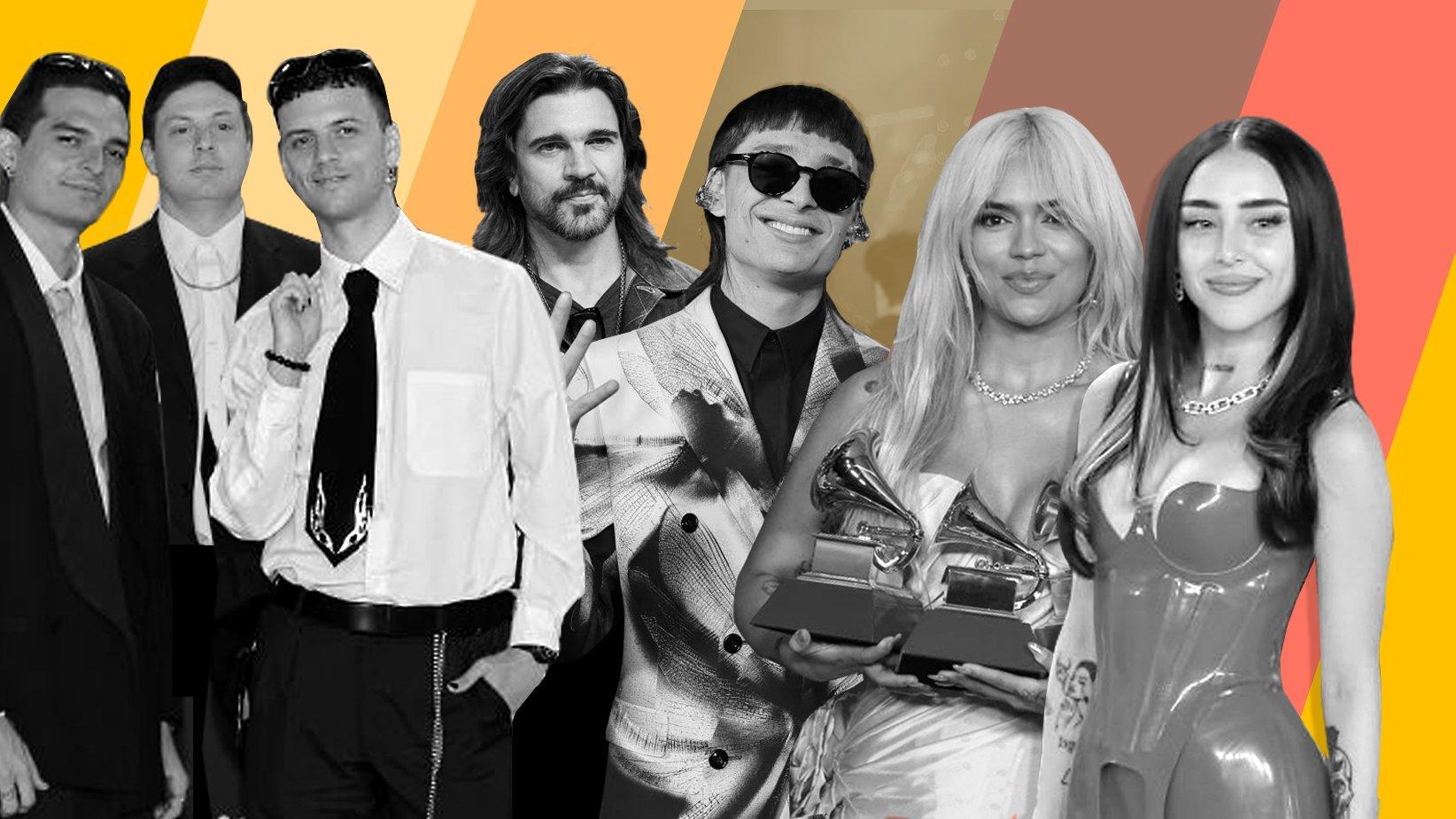
Photos: Neilson Barnard/Getty Images for Latin Recording Academy; Borja B. Hojas/Getty Images; Neilson Barnard/Getty Images for Latin Recording Academy; Patricia J. Garcinuno/WireImage; Juan Naharro Gimenez/Getty Images
news
2023 In Review: 5 Trends That Defined Latin Music
2023 was a transformative year for Latin music: Música mexicana expanded globally; urbano music continued its dominance and innovative sounds broke boundaries. Read on for five trends showcasing the breadth of Latin music's influence.
2022 was the year of Rosalía’s Motomami and Bad Bunny’s Un Verano Sin Ti — two groundbreaking albums that expanded both the artistic scope and mainstream appeal of Latin music. How do you top that?
As it turns out, 2023 had a number of surprises in store: the emergence of música mexicana on an international scale, but also the further globalization of Latin sounds and new developments in urbano music, which continues to gain in influence and sophistication. It was also a particularly prolific year — with hundreds of singles, EPs and albums expanding the scope of Latin across genres and formats.
Here are some of the notable trends that emerged during the past 12 months.
Finally, Música Mexicana Gets The Chance To Shine
Reggaetón and urbano were at the forefront of the Latin music tsunami that began to take hold of the entire planet a good three years ago. During that time, many insiders pondered if the huge field of so-called regional Mexican music would ever enjoy such levels of exposure. Turns out there was nothing regional about it.
Far from stagnating, the genre evolved with the rise of the sparse, melancholy sound known as sad sierreño, and the swagger of hip-hop informing the zeitgeist of young artists like Natanael Cano and Junior H.
2023 will be forever remembered as the year when música mexicana connected with the world at large, and it happened mostly through one song: "Ella Baila Sola," the collaboration between Jalisco singer Peso Pluma and Cali group Eslabón Armado — a tune whose spiraling groove is so buoyant and infectious, it transcends borders. The subversive duet of Bad Bunny and Grupo Frontera on mega-hit "un x100to" didn’t hurt either, and the movement gained strength with Peso Pluma’s excellent third LP, as well as the talents of young stars such as Fuerza Regida, Gabito Ballesteros and Yahritza y Su Esencia.
When It Comes To Latin Rock, Argentina Is Still At The Forefront
From Charly García and Luis Alberto Spinetta to Soda Stereo and Babasónicos, Argentina boasts a fierce tradition for generating legendary rock albums. Even though the South American nation has embraced the present with such urbano stars as Bizarrap, Duki and Nicki Nicole, there will always be a place of honor reserved for good old fashioned rock’n’roll in Argentina’s clubs and recording studios.
2023 was no exception. Hailing from the city of La Plata, Él Mató a un Policía Motorizado released Súper Terror. Their first full length album since 2017's La Síntesis O’Konor, the new LP includes atmospheric ballads like the gorgeous "Medalla de Oro." Another top contender is Tripolar, the third effort by Mendoza indie darlings Usted Señalemelo.
Also of note: Lo Más Cercano a Caer, the stunning debut by Nenagenix. Fronted by singer Martina Sampietro, the band has dreamed up a ferocious collection of songs with inspired touches of grunge and shoegaze.
Pop Stardom Is A Young Artist’s Game…
Popular music has always reflected the combustion and adrenaline of youth, but the immediacy of the digital era has heightened this fact. It seems that the transition from self-taught teens uploading their demos in TikTok to fully fledged stars performing at Coachella has become even more rapid.
Some of the most successful Latin artists climbing the 2023 charts have had only a couple of years to transition into pop icon status — and the vulnerability of their emotional state is often expressed in their music. From the reggaetón-fueled erotic narratives of 21 year-old Madrid rapper Quevedo ("PUNTO G") to the bachata-pop warmth of 19 year-old Mexican/American DannyLux ("MI HOGAR," with maye) and the confessional urbano narratives of 22-year-old Argentine vocalist Tiago PZK (the TINI duet "Me Enteré"), many young artists found the global platform where they could freely express their longings and dreams.
...But The Veterans Have Still Plenty To Say
Years of accolades have not dimmed the creative vision of veteran Latin artists. In the case of Juanes, a marital crisis during the pandemic inspired Vida Cotidiana — arguably the Colombian singer’s best album to date. Just listen to the gritty guitar textures of the majestic "Gris" and the spiraling Afro lines of "Cecilia," a sun-is-shining-again duet with Juan Luis Guerra. Vida Cotidiana is nominated for Best Latin Rock or Alternative Album alongside Cabra's MARTÍNEZ, Leche De Tigre by Diamante Eléctrico, Natalia Lafourcade's De Todas Las Flores and EADDA9223 by Fito Paez.
At 46, Shakira finds herself at the top of her game, with major pop culture moments like her Bizarrap collaboration — the most epic revenge song of the year and a Latin GRAMMY winner— and the jagged edges of "TQG," her duet with KAROL G.
Having developed a tradition of recording solo excursions in Paris, Zoé frontman León Larregui explored his hazy psychedelic mystique on PRISMARAMA, the Mexican singer’s excellent — and first self-produced — third outing.
The Urbano Groove May Never Run Out Of Steam
You may think that global audiences would have tired of the ubiquitous reggaetón beat. But the music of Puerto Rico — just like traditional salsa in the ‘70s – has a gravitas that rewards longer attention spans. Fittingly for a genre known for its prolific work ethic, some of the biggest names in urbano released albums in 2023, and none of them disappoint.
One listen to the refined melody of "MÓNACO" — like a reggaetón take on a James Bond theme — is enough to realize that Bad Bunny’s creative streak hasn’t slowed down since he reimagined the Latin pop atlas with Un Verano Sin Ti. Known for his honeyed dance hits, Ozuna put out an EP (Afro) and an album (Cosmo), including the synth-pop magic of "Vocation," with producer David Guetta.
Last but not least, KAROL G’s MAÑANA SERÁ BONITO demonstrates on luminous tracks like "PROVENZA" and "CAIRO" that her work with fellow Colombian producer Ovy on the Drums is one of the defining artistic partnerships of the decade. MAÑANA is nominated for Best Música Urbana Album at the 2024 GRAMMYs alongside Rauw Alejandro's SATURNO and Tainy's DATA.
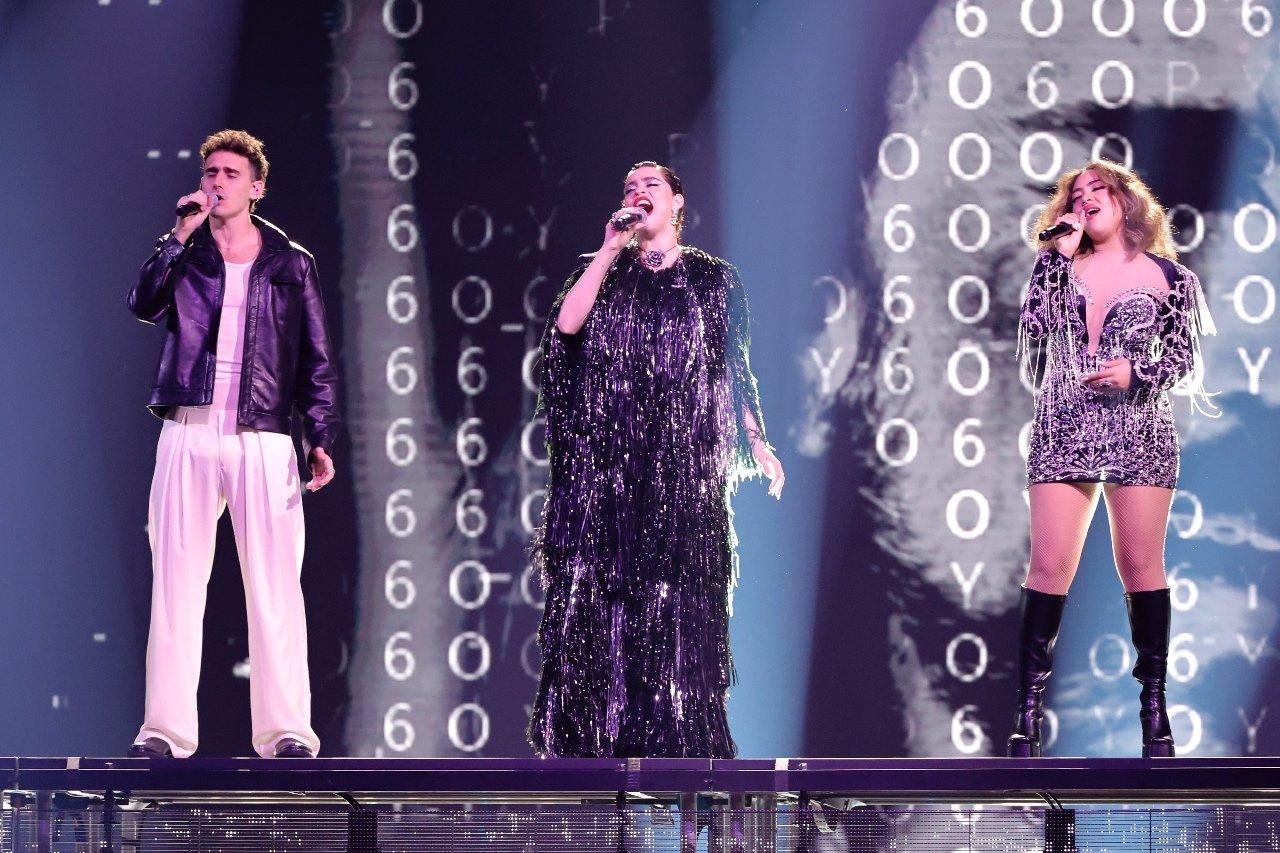
Photo: Kevin Winter/Getty Images for Latin Recording Academy
list
10 Incredible Moments From The 2023 Latin GRAMMYs: Rosalía, Shakira, Peso Pluma & More
The 2023 Latin GRAMMYs were truly international, embracing sounds of flamenco, norteño, reggaetón, and everything in between. Read on for 10 of the most exciting moments from the Biggest Night In Latin Music.
It is not a coincidence that the 24th annual edition of the Latin GRAMMYs took place in Sevilla, Spain — far away from the traditional epicenters of Latin music production. More than ever before, the sound of the Latin GRAMMYs are truly international, embraced by fans all over the world.
At a time of unprecedented global turmoil and collective anxiety, the songs of Bad Bunny, Shakira, Peso Pluma and Rosalía — to name a few of many reigning stars — have enough zest, honesty and passion in them to provide comfort. Both Spain and Latin America boast a long standing tradition of healing through rhythm and melody. Not surprisingly, this year's ceremony felt like a casual gathering of friends for an evening of dancing and celebrating.
From the strains of flamenco to the boom of Mexican music and the ongoing permutations of reggaetón, these are the takeaway points from the unforgettable 2023 Latin GRAMMYs.
The Genius Of Rosalía Transcends Her Own Songbook
It was only fitting that Rosalía — one of the most visionary singer/songwriters in global pop — should open up the first Latin GRAMMY ceremony in Spanish territory.
She could have certainly taken advantage of the opportunity to drop a new single or perform one of her many hits. Instead, Rosalía sang an achingly beautiful version of the 1985 classic "Se Nos Rompió El Amor" by the late singer Rocío Jurado. It was a lovely way to deflect the spotlight and focus on celebrating her Spanish roots.
Spain And Latin America Make Beautiful Music Together
From beginning to end, the telecast underscored the organic kinship that unites the music of Spain and Latin America. It took place during the International Day of Flamenco, and the transcendent genre was present in Alejandro Sanz's moving performance of "Corazón Partío." The award for Best Flamenco Album, won by Niña Pastori for Camino, was presented during the main ceremony — a GRAMMY first.
Later in the telecast, Spanish pop singer Manuel Carrasco and Colombian artist Camilo performed an acoustic duet of "Salitre." They were soon joined by Brazilian singer IZA Texas-born producer/songwriter Edgar Barrera, transforming the Sevilla stage with Carnivalesque energy.
Hell Hath No Fury Like A Pop Star Scorned
Since its release in January, “Shakira: Bzrp Music Sessions, Vol. 53,” the collaboration between Shakira and Argentine producer Bizarrap, has become a global cultural phenomenon. Not only is it a grand pop song with slick EDM accents, but the Colombian diva's lyrics struck a chord with its message of empowerment and fortitude in the face of adversity.
The duo's brisk performance — preceded by a brief intro with Shaki showcasing her tango dancing skills — was an iconic pop culture moment. The track itself won awards in the Best Pop Song and Song Of The Year categories.
Emerging Talent Is The Lifeline That Keeps Latin Music Alive
Watching young artists performing together with the legends that inspired them is a Latin GRAMMY staple. This year was particularly poignant, as Colombian singer/songwriter Juanes performed a moving rendition of the atmospheric rocker "Gris" — about overcoming a relationship crisis — with majestic background vocals provided by six of the 10 Best New Artist nominees: Borja, Natascha Falcão, GALE, Paola Guanche, León Leiden and Joaquina — who ended up winning the award.
For Mexico, The Time Is Now
The moment was ripe for the richness and depth of música Mexicana to shine on an international scale. 2023 was the year when the entire world fell in love with the strains of banda, norteño and corridos tumbados.
The infectious collaboration between Peso Pluma and Eslabón Armado, "Ella Baila Sola" became the emblem of this revolución mexicana. A buoyant rendition of the track was a telecast highlight, as well as the performance by Carín León, who won the award for Best Norteño Album.
Laura Pausini's Artistry Evokes The Elegance Of Decades Past
Introducing herself as "the most [expletive] Latina Italian woman in the world," Laura Pausini seemed overjoyed with her Person Of The Year award. Her medley of career highlights — full of drama and gorgeous melodies — included nods to her first mega-hit, the nostalgic "La Solitudine," and the cinematic "Víveme."
"I thank my father because he chose not to go to the movies with my mom, and instead stayed at home, made love to her and had me, the Person Of The Year," Pausini quipped. Her songbook evokes the golden era of Latin pop, a time of elegance and style.
Radical Genre Bending Never Fails To Intrigue
Latin music is currently experiencing a moment of grace, and this creative apex is frequently expressed through intriguing fusions of seemingly disparate styles. The adrenaline-fueled performance by Puerto Rican neo-reggaetón star Rauw Alejandro gained in electricity when he was joined by Juanes on a rocked-up rendition of "BABY HELLO."
Elsewhere, Carín León's duet with Maluma and Bizarrap's foray into electro-tango were fueled by a similar spirit of playful experimentation.
Exquisite Singing & Songwriting Will Never Go Out Of Style
There's something to be said about an album that was recorded live on tape with analog equipment — the singer surrounded by her band, as they perform together in the same space, with no outside guests allowed.
Natalia Lafourcade's "De Todas Las Flores" is all about feeling and warmth, her vulnerable vocals framed by delicate piano notes and supple percussion. A worthy Record Of The Year winner, this exquisitely layered track proposes that some traditional methods of music making are definitely worth preserving. At the Premiere Ceremony, Lafourcade also took home golden gramophones for Best Singer-Songwriter Song and Best Singer-Songwriter Album.
Hip-Hop Is A Natural Component Of The Latin Music DNA
At the tail end of the ceremony, the performance by Colombian vocalist Feid — aided by the stellar skills of producer DJ Premier — included a moody reading of "Le Pido a DIOS" with nods to '90s rap and jazzy keyboard flourishes. Just like EDM, hip-hop has been fully incorporated into the Latin music lexicon, assuming an identity of its own.
KAROL G Is Much, Much More Than Just A Global Pop Star
Just like Rosalía's Motomami, KAROL G's fourth studio LP – winner of the coveted Album Of The Year award — will be remembered for the dazzling quality of its songs and the kind of indelible magic that can only be experienced, not described. The Colombian singer's artistic partnership with producer Ovy On The Drums has resulted in a futuristic sound that leaves ample space for the warmth of her vocals — and it grooves like crazy.
Most importantly, MAÑANA SERÁ BONITO celebrates the small pleasures, the brief glimpses of inner peace, and the decision to embrace self-acceptance even in the wake of emotional storms. In KAROL G's world, optimism is the only pathway out to a better tomorrow.
2023 Latin GRAMMYs: See The Complete Winners & Nominations List
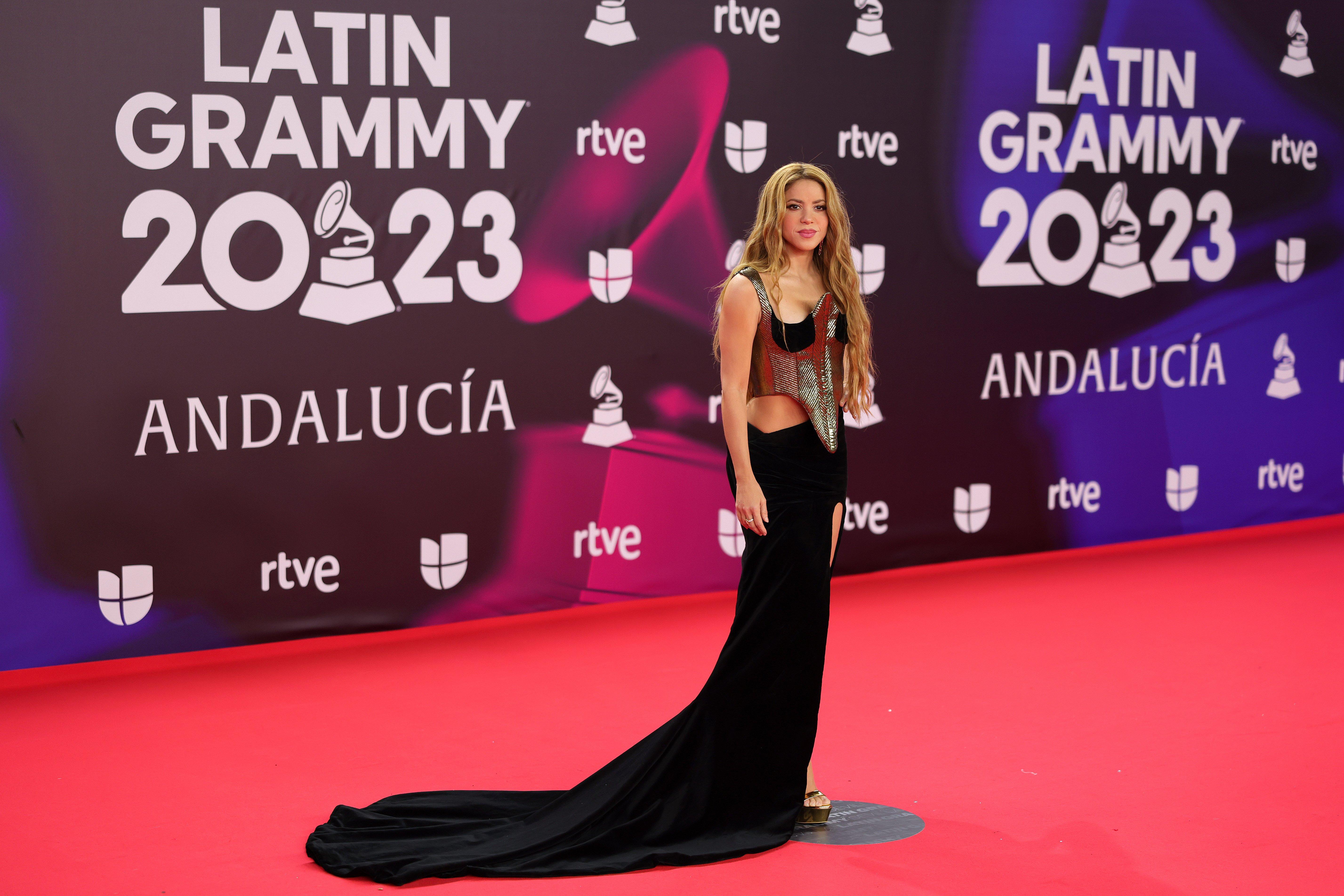
Photo: Neilson Barnard/Getty Images for Latin Recording Academy
news
2023 Latin GRAMMYs Red Carpet Fashion: See Pics Of Rosalía, Karol G, Peso Pluma, Shakira, Bizarrap, & More
For the 24th Latin GRAMMYs Awards, Latin music's biggest artists graced Sevilla, Spain’s royal red carpet in their most dazzling outfits.
The 2023 Latin GRAMMYs are not just The Biggest Night In Latin Music — it was also an occasion for the leading lights in Latin music to don a plethora of eye-catching outfits. Just as many of the nominated artists blend genres and break barriers, so too did their sartorial choices.
Latin GRAMMY performers and nominees demonstrated their individuality and creativity with extravagant, playful styles. Artists including Rosalía, Karol G, Bizarrap, Peso Pluma, Juanes, and Sebastián Yatra donned jaw-dropping award show looks. Daniela Santiago, Liz Trujillo and Sandra Calixto of Música Mexicana group Conexión Divina coordinated their all black and leather ensembles, while singer/songwriter Natalia Lafourcade — who took home multiple Latin GRAMMYs for, including Record Of The Year, for "De Todas Las Flores" — added a satin green touch to the red carpet.
The most-nominated artists at the 2023 Latin GRAMMYs are Camilo, Karol G and Shakira, each of whom have seven nominations. Songwriter and composer Keityn also received seven nominations. Edgar Barrera, who took home the Latin GRAMMY Award for Producer Of The Year, led the night with 13 nominations.
Hosted by Latin GRAMMY winner and performer Sebsatián Yatra, GRAMMY nominee and actress Danna Paola, along with critically-acclaimed actresses Roselyn Sánchez and Paz Vega — who each also made fashion statements — the 2023 Latin GRAMMYs were an aural and visual night to remember.
Here are some of our favorite looks from the red carpet at the FIBES Conference and Exhibition Centre in Sevilla, Spain.
Karol G ┃John Parra/Getty Images for Latin Recording Academy
Rosalía | Patricia J. Garcinuno/WireImage
Bizarrap | Juan Naharro Gimenez/Getty Images
Natalia Lafourcade ┃Juan Naharro Gimenez/Getty Images
Peso Pluma and Nicki Nicole┃Rodrigo Varela/Getty Images for Latin Recording Academy
Sebastian Yatra┃Patricia J. Garcinuno/WireImage
Conexión Divina┃Juan Naharro Gimenez/Getty Images
Karen Martinez and Juanes┃Neilson Barnard/Getty Images for Latin Recording Academy
Mon Laferte┃Rodrigo Varela/Getty Images for Latin Recording Academy
Edgar Barrera┃Neilson Barnard/Getty Images for Latin Recording Academy
Maria Becerra┃Rodrigo Varela/Getty Images for Latin Recording Academy
India Martínez┃Rodrigo Varela/Getty Images for Latin Recording Academy
Joaquina┃Rodrigo Varela/Getty Images for Latin Recording Academy
Kenia OS┃Neilson Barnard/Getty Images for Latin Recording Academy
Sita Abellán┃Patricia J. Garcinuno/WireImage
2023 Latin GRAMMYs: See The Complete Winners & Nominations List
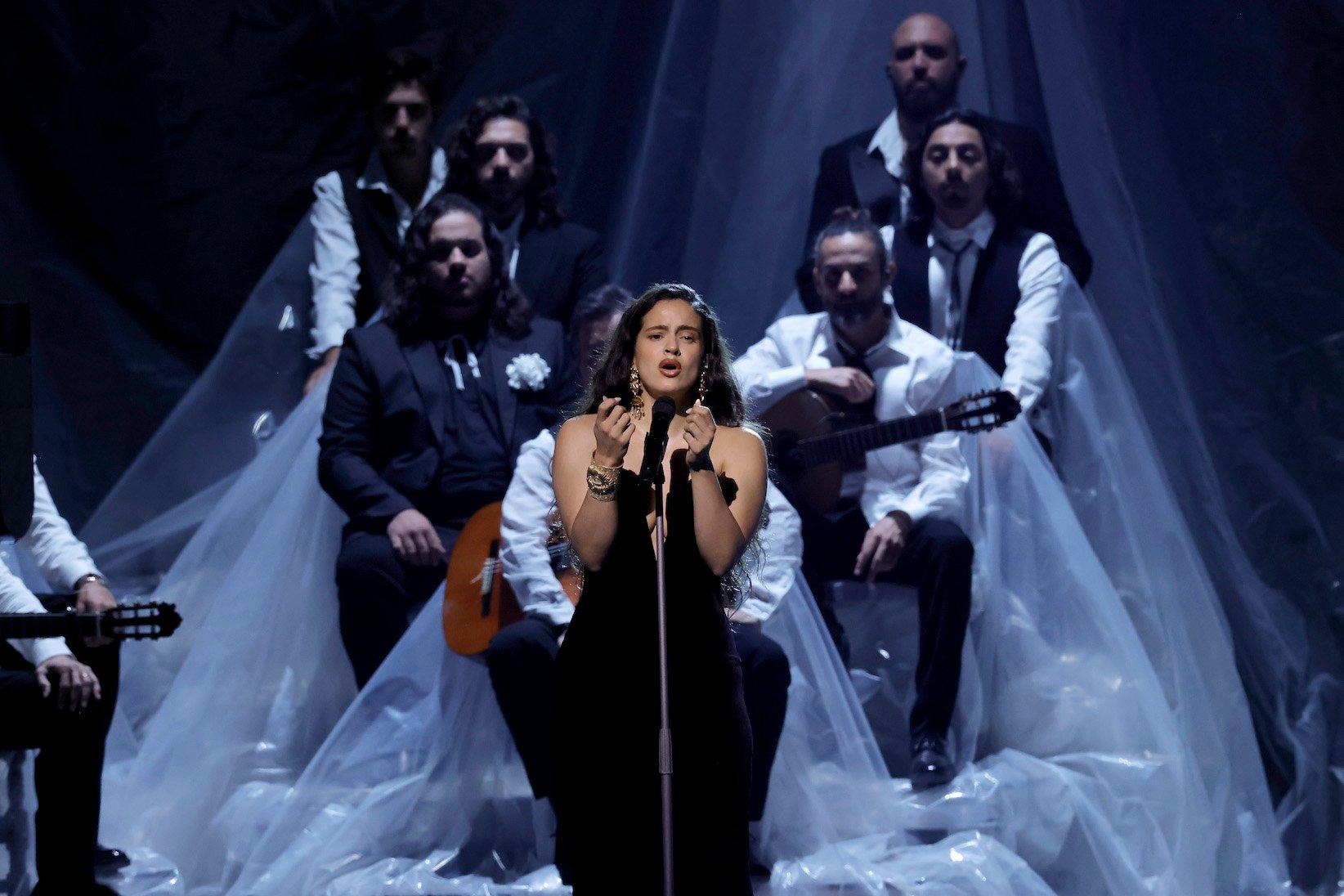
Photo: Kevin Winter/Getty Images for Latin Recording Academy
news
Watch: Rosalía Delivers Powerful, Flamenco-Driven Performance Of "Se Nos Rompió El Amor" At The 2023 Latin GRAMMYs
The Record Of The Year nominee is the world’s most famous ambassador for flamenco. Her performance of "Se Nos Rompió El Amor" at the 2023 Latin GRAMMYs was a compelling tribute to the genre.
Rosalía’s performance in her home country and birthplace of her musical influences was one of the most anticipated (and speculated about) moments of the 2023 Latin GRAMMYs.
Before Rosalía added electronic production to her sound and caught a one-way flight to global fame, the Spanish singer was a student of flamenco and her music still draws inspiration from rhythms of the genre. Now the world’s most famous ambassador for flamenco, her performance — in Sevilla, in the heart of Andalusia, where flamenco originated — was a powerful tribute to the genre.
Donning an elegant strapless black dress and gold earrings, the Spanish singer opened the 2023 Latin GRAMMYs with a flamenco ballad. Flanked by an orchestra of flamenco guitarists and percussionists, Rosalía offered a moving take on Rocío Jurado’s "Se Nos Rompió El Amor."
Her performance concluded with a standing ovation.
This was the third time Rosalía brought her act to the Latin GRAMMYs. In 2019, she took home four golden gramophones, notably for Album Of The Year for El Mal Querer. In 2022, she won four Latin GRAMMYs once more, including Album Of The Year for Motomami, a feat that made her the first female artist to win the award twice. At the 2023 GRAMMYs, Motomami was also awarded a GRAMMY for Best Latin Rock or Alternative Album.
At this year’s Latin GRAMMYs, the flamenco-pop star is up for Record Of The Year for her 2022 single "Despechá," a mambo-meets-electro-merengue joint inspired by Dominican artists such as Juan Luis Guerra.
